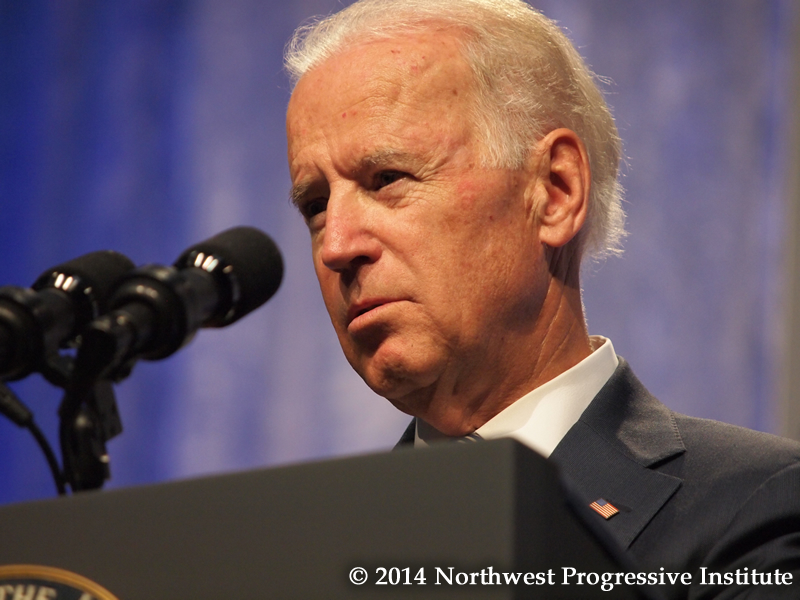Joe Biden showcased his foreign policy plans in a major speech on Thursday.
The former vice president rejected the Trump regime’s attempts at dealmaking and isolationism, arguing for a return to the Obama administration’s emphasis on broad international agreements and collaboration through global institutions.
If elected, Biden said he would call a summit of the world’s democratic countries and major companies in his first year in office.

The aim of the summit would be to “refocus our common purpose” and to “challenge the private sector – including tech companies, social media companies – to make their own commitments to make democracy more resilient.”
Biden’s policy contains three major components: Firstly, he would repair democracy by remaking the education system and “ending various practices that are undermining our democracy at home.” Secondly, a Biden administration would work with allies to confront China and other “bad actors” in the global economy. Lastly, Biden plans to restore the hollowed-out State Department, so that the United States can be “back at the head of the table in mobilizing global action.”
The speech appeared to be an effort by Biden to revitalize his campaign after a poor performance in last month’s initial primary debate in Miami.
In the debate, Biden was challenged by Senator Kamala Harris regarding his record on racial justice and was told by Representative Eric Swalwell (who recently dropped out of the race) to “pass on the torch” to a younger generation.
Biden’s team is hoping that with this speech, they can change the conversation surrounding Biden’s record. Many Democratic voters find Biden’s record questionable (to say the least) when they look at his handling of issues like race and sexism. The Biden campaign would instead like to talk about Biden’s vast foreign policy experience and his record as Vice President (as opposed to his record as a United States Senator from Delaware).

Biden’s speech could open the gates for more conversation about foreign policy, which has not received that much attention in the Democratic presidential contest so far, to the frustration of some commentators. However, by emphasizing his foreign policy platform, Biden is inviting criticism of a different part of his record.
In 2002, Biden was an enthusiastic supporter of the Iraq invasion and only slowly changed his tune on the disastrous, destabilizing conflict. Bernie Sanders has already criticized Biden for this, and Biden’s foreign policy speech could encourage more of his rivals to talk about the mistake of backing Bush’s invasion.
Furthermore, Biden’s policies sound great at a sound bite level, but any such plan will likely run into a series of real-world brick walls.
Biden’s call for a summit of democratic nations raises an important question: Who decides which countries are democratic?
Many countries in the world have the trappings of democracy, but it seems highly unlikely that Russia or Iran will be invited to the summit. The United States – the backer of authoritarian regimes Saudi Arabia – can’t expect to be regarded by the world community as a fair arbiter of a country’s democratic status.
Any attempt to “refocus common purpose” among democratic nations will be a difficult challenge given the diversity of ideology and national interests.
It’s hard to imagine Canada and Germany getting on the same page as India, Israel or Poland on a wide range of issues; all three are strong democracies, but they are currently governed by fanatical, anti-democratic, xenophobic leaders who are not enthusiastic about the international partnerships Biden wants to foster.
Inviting the world’s largest companies to participate in the proposed summit is also a recipe for trouble. Megacorporations are not representative of any population; they are inherently undemocratic. (How many employees get to vote for their chief executive officer and senior management?)
Not only that, but the call to tech giants to help strengthen democracy ignores that industry’s behavior. Google, for example, makes billions of dollars by helping China surveil its population, while the cult-of-personality surrounding Facebook’s founder, Mark Zuckerberg, is reminiscent of Stalin’s Russia. Including such actors in a meeting of democratic nations would be an insult to democracy itself.
However, the flaws in Biden’s plan might not matter. One plan for tackling one issue area generally doesn’t make or break a candidacy. The Democratic candidates’ differences on domestic concerns (from healthcare to housing) are likely to be more pronounced than their differences on foreign policy.

